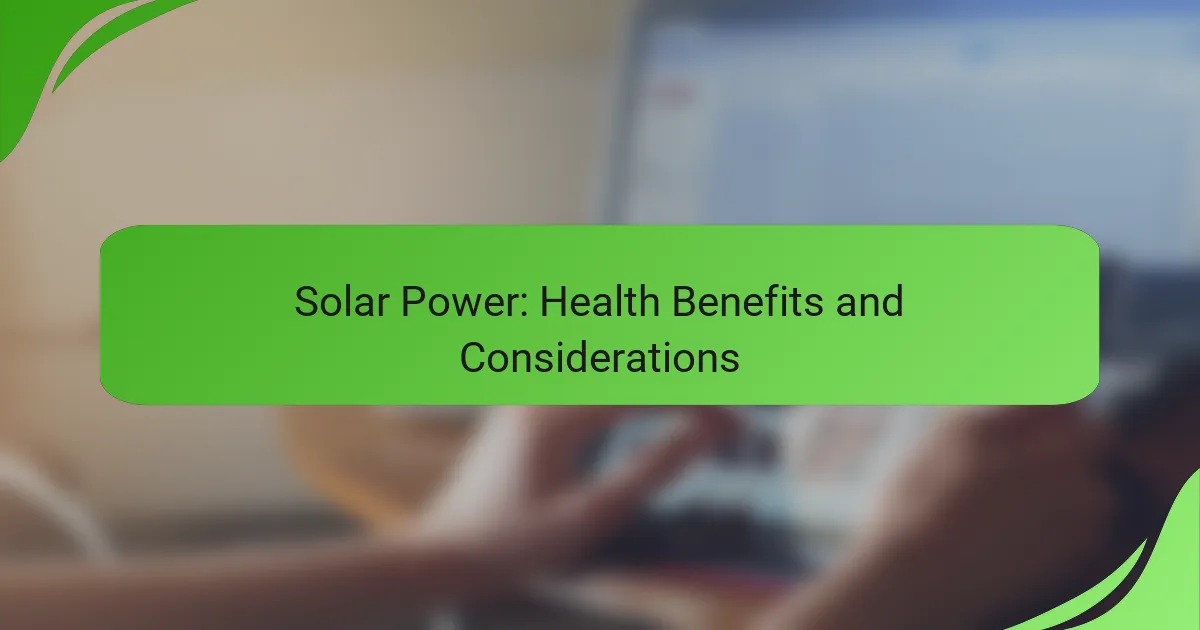Solar power presents numerous health benefits, particularly in urban areas, by decreasing reliance on fossil fuels and subsequently reducing air pollution. This transition not only fosters a cleaner environment but also promotes better health outcomes for residents. Additionally, solar energy contributes to economic health by lowering energy costs and creating job opportunities in the renewable energy sector.
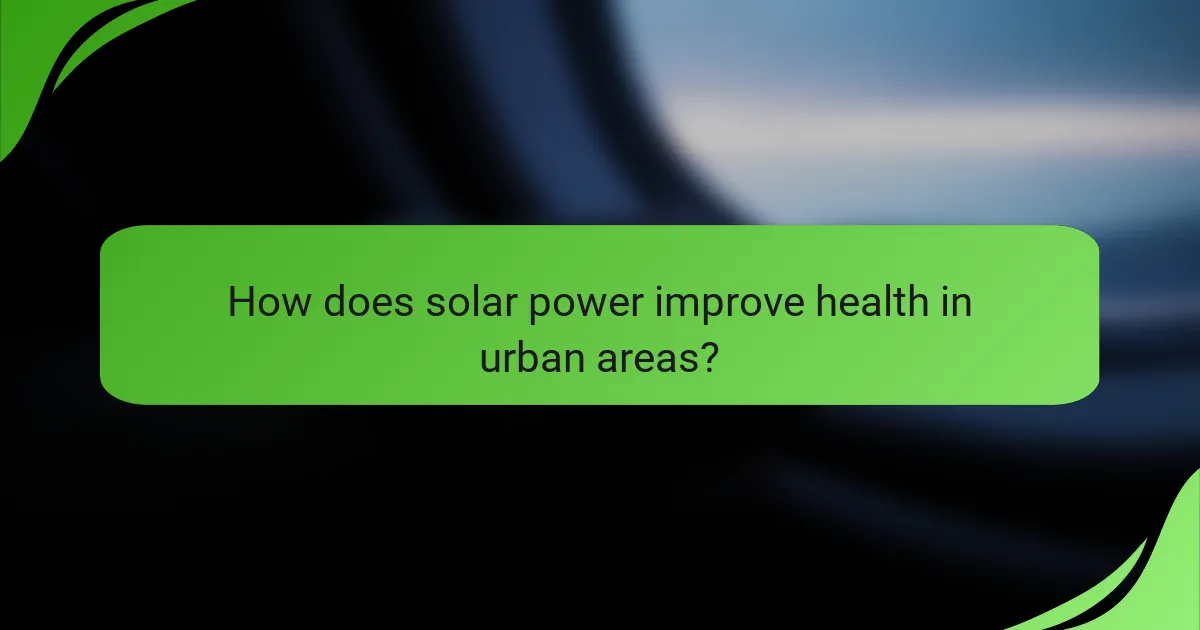
How does solar power improve health in urban areas?
Solar power improves health in urban areas by reducing reliance on fossil fuels, which in turn decreases air pollution and its associated health risks. By transitioning to solar energy, cities can create a cleaner environment that promotes better overall health for residents.
Reduces air pollution
Solar power significantly reduces air pollution by minimizing emissions from traditional energy sources like coal and natural gas. This transition leads to lower levels of harmful pollutants such as sulfur dioxide and nitrogen oxides, which are known to contribute to smog and respiratory issues.
In urban areas, where vehicle traffic and industrial activities are prevalent, the adoption of solar energy can lead to a noticeable decrease in air contaminants. Cleaner air not only benefits individual health but also enhances the quality of life in densely populated regions.
Decreases respiratory diseases
With reduced air pollution, solar power contributes to a decline in respiratory diseases such as asthma and chronic obstructive pulmonary disease (COPD). Studies indicate that cleaner air can lead to fewer hospital visits and lower healthcare costs associated with respiratory conditions.
Urban populations, particularly vulnerable groups like children and the elderly, can experience significant health improvements when solar energy is utilized. This shift can result in healthier communities with fewer instances of respiratory-related illnesses.
Enhances mental well-being
The use of solar power can enhance mental well-being by promoting a cleaner, more sustainable environment. Access to clean air and reduced noise pollution from fossil fuel power plants can lead to lower stress levels and improved mood among urban residents.
Moreover, solar energy projects often involve community engagement and green space development, which can foster social connections and a sense of belonging. These factors contribute positively to mental health, making solar power a vital component of urban health strategies.
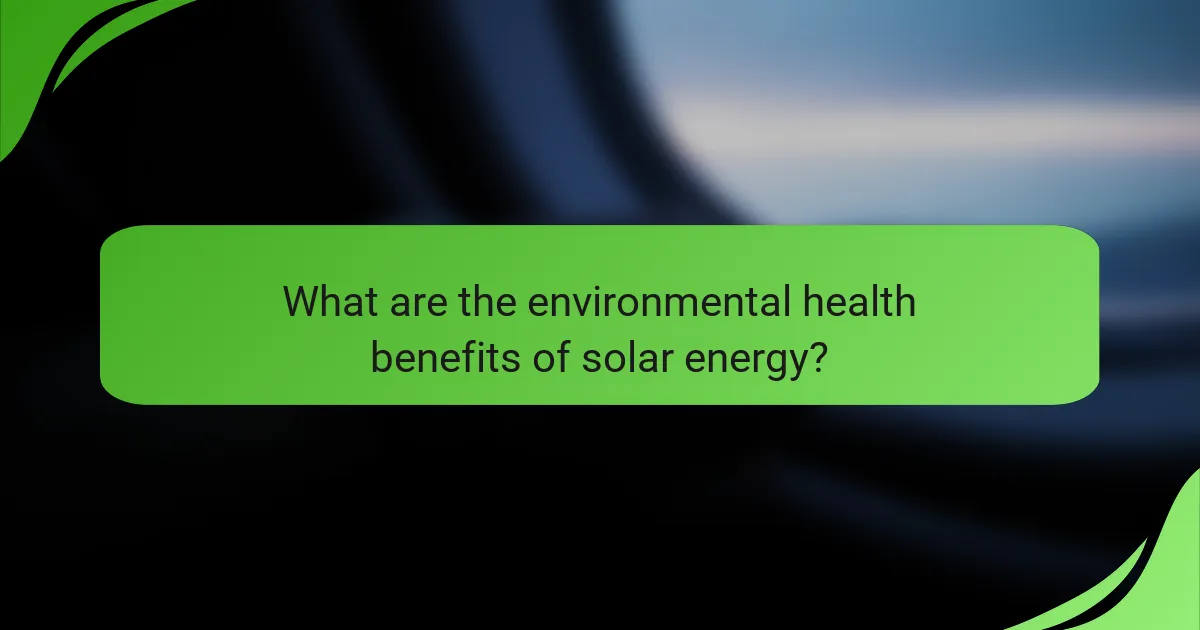
What are the environmental health benefits of solar energy?
Solar energy offers significant environmental health benefits by reducing greenhouse gas emissions and minimizing air pollution. By harnessing the sun’s power, solar energy contributes to cleaner air and a more sustainable planet.
Mitigates climate change effects
Solar energy plays a crucial role in mitigating the effects of climate change by decreasing reliance on fossil fuels. As solar installations increase, they help lower carbon dioxide emissions, which are a primary driver of global warming.
In practical terms, transitioning to solar can reduce the carbon footprint of households and businesses. For example, a typical residential solar system can offset several tons of CO2 annually, contributing to a healthier atmosphere.
Conserves water resources
Solar energy systems use significantly less water compared to traditional energy sources, such as coal and natural gas, which require large amounts for cooling and processing. This conservation is vital in regions facing water scarcity.
By opting for solar power, communities can help preserve local water supplies. For instance, solar photovoltaic systems typically use little to no water during operation, making them a sustainable choice in arid areas.
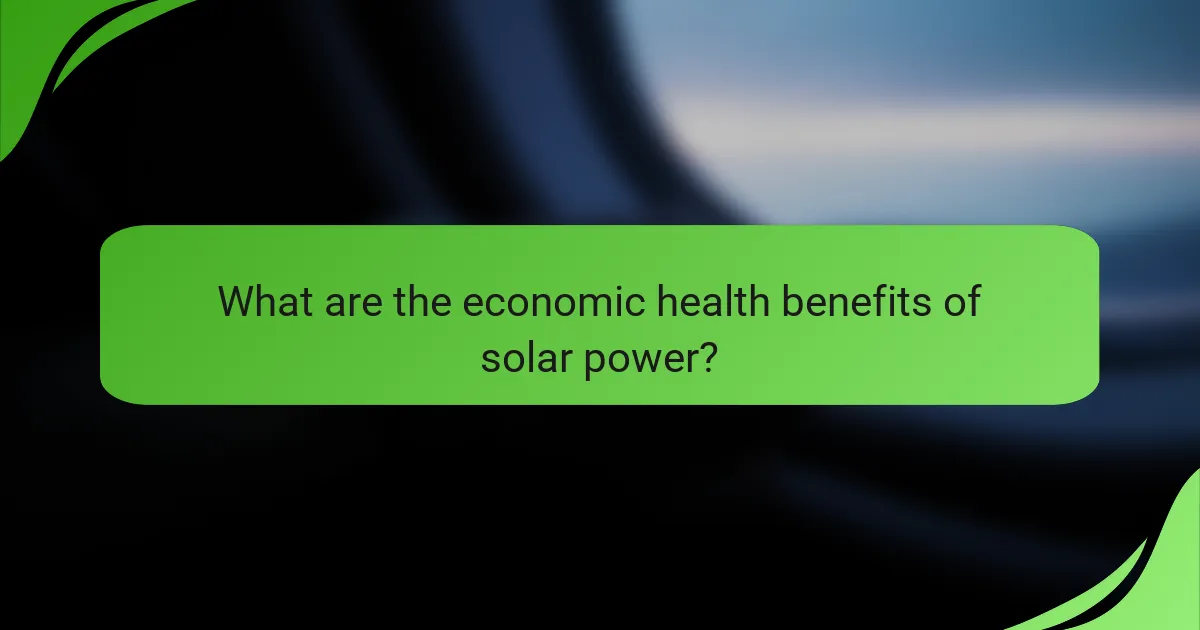
What are the economic health benefits of solar power?
The economic health benefits of solar power primarily include reduced energy costs and job creation. By harnessing solar energy, households and businesses can significantly lower their electricity bills while contributing to local employment opportunities in the renewable energy sector.
Reduces energy costs
Solar power systems can drastically reduce monthly energy expenses. Homeowners who install solar panels often see their electricity bills decrease by 50% or more, depending on their energy consumption and local sunlight availability.
Additionally, many regions offer incentives such as tax credits or rebates for solar installations, further lowering upfront costs. This financial relief can be particularly beneficial in areas with high energy prices, allowing families to allocate funds to other essential needs.
Creates local jobs
The solar power industry is a significant source of job creation, with positions ranging from manufacturing to installation and maintenance. As demand for solar energy increases, so does the need for skilled workers, often leading to the establishment of local training programs.
In many countries, the growth of solar energy has resulted in thousands of new jobs, contributing to the local economy. Investing in solar power not only supports environmental goals but also strengthens community employment and economic stability.
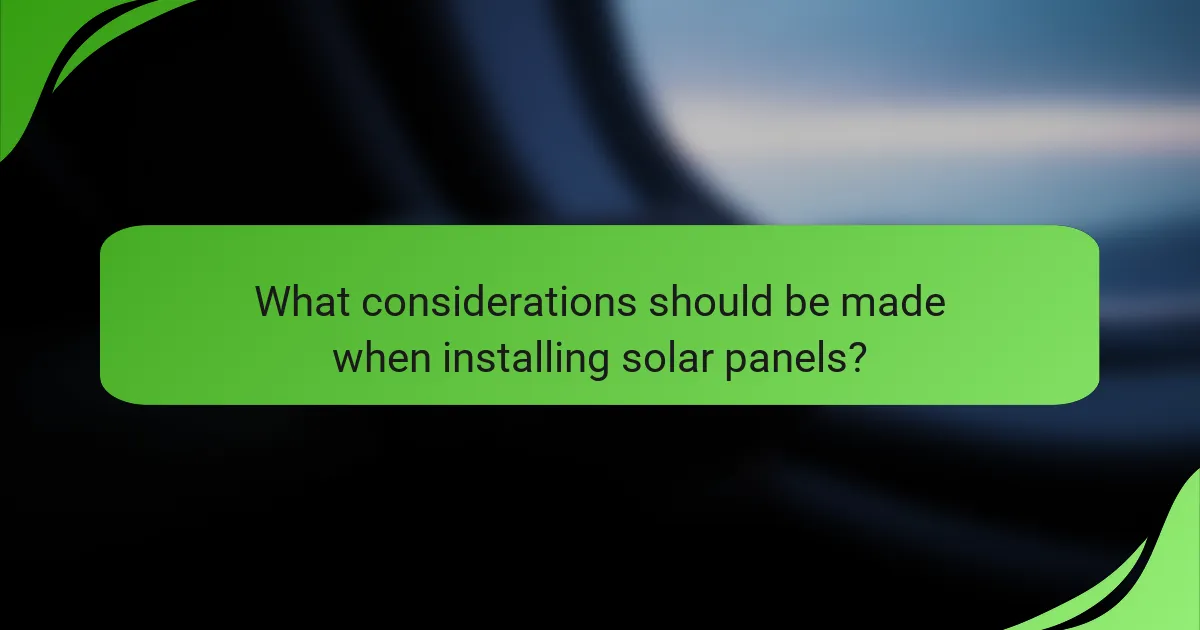
What considerations should be made when installing solar panels?
When installing solar panels, it’s essential to evaluate the site, understand local regulations, and secure necessary permits. These considerations ensure optimal performance and compliance with legal requirements.
Site assessment requirements
Conducting a thorough site assessment is crucial for solar panel installation. Factors such as roof orientation, shading from nearby trees or buildings, and structural integrity must be evaluated. Ideally, panels should face south in the Northern Hemisphere for maximum sunlight exposure.
Additionally, consider the available space for the solar array. A typical residential installation may require at least 200 to 400 square feet, depending on energy needs and panel efficiency. Assessing these elements helps in determining the system’s potential energy output.
Local regulations and permits
Before installing solar panels, familiarize yourself with local regulations and permitting processes. Many areas require permits for installation, which may involve submitting plans and undergoing inspections. Check with your local government or utility provider for specific requirements.
Regulations can vary significantly by region, so understanding zoning laws and any incentives or rebates available can be beneficial. For instance, some states in the U.S. offer tax credits or rebates that can offset installation costs, making compliance even more advantageous.

How does solar power impact community health?
Solar power positively influences community health by reducing air pollution and greenhouse gas emissions, leading to cleaner air and a healthier environment. This transition to renewable energy sources can decrease respiratory issues and other health problems associated with fossil fuel consumption.
Promotes energy independence
Solar power enhances energy independence by allowing communities to generate their own electricity, reducing reliance on external energy sources. This local generation can lead to more stable energy prices and less vulnerability to market fluctuations.
By investing in solar infrastructure, communities can create jobs and stimulate local economies. Energy independence also fosters resilience during energy crises, ensuring that essential services remain operational even during outages.
Encourages sustainable practices
Adopting solar power encourages sustainable practices by promoting the use of renewable resources and reducing carbon footprints. Communities that embrace solar energy often implement additional green initiatives, such as energy efficiency programs and waste reduction strategies.
These sustainable practices can lead to improved public health outcomes, as they contribute to cleaner air and reduced environmental degradation. Community engagement in solar projects can also raise awareness about sustainability, fostering a culture of environmental responsibility.

What are the potential health risks associated with solar power?
While solar power is generally considered a clean energy source, there are potential health risks associated with its production and implementation. These risks primarily stem from chemical exposure during manufacturing and land use impacts that can affect local ecosystems and communities.
Exposure to chemicals in manufacturing
The production of solar panels involves various chemicals that can pose health risks if not managed properly. Substances like cadmium and silicon are used in the manufacturing process, and improper handling can lead to exposure for workers and nearby residents.
To mitigate these risks, manufacturers must adhere to strict safety regulations and environmental standards. For example, the European Union has guidelines that limit the use of hazardous materials in solar panel production, promoting safer alternatives.
Land use concerns
Installing solar farms requires significant land, which can lead to habitat disruption and loss of biodiversity. This land use can impact local wildlife and ecosystems, potentially leading to long-term environmental health issues.
When planning solar projects, it is crucial to conduct thorough environmental assessments to minimize negative impacts. Utilizing previously disturbed land or rooftops for solar installations can help reduce these concerns while maximizing energy production.
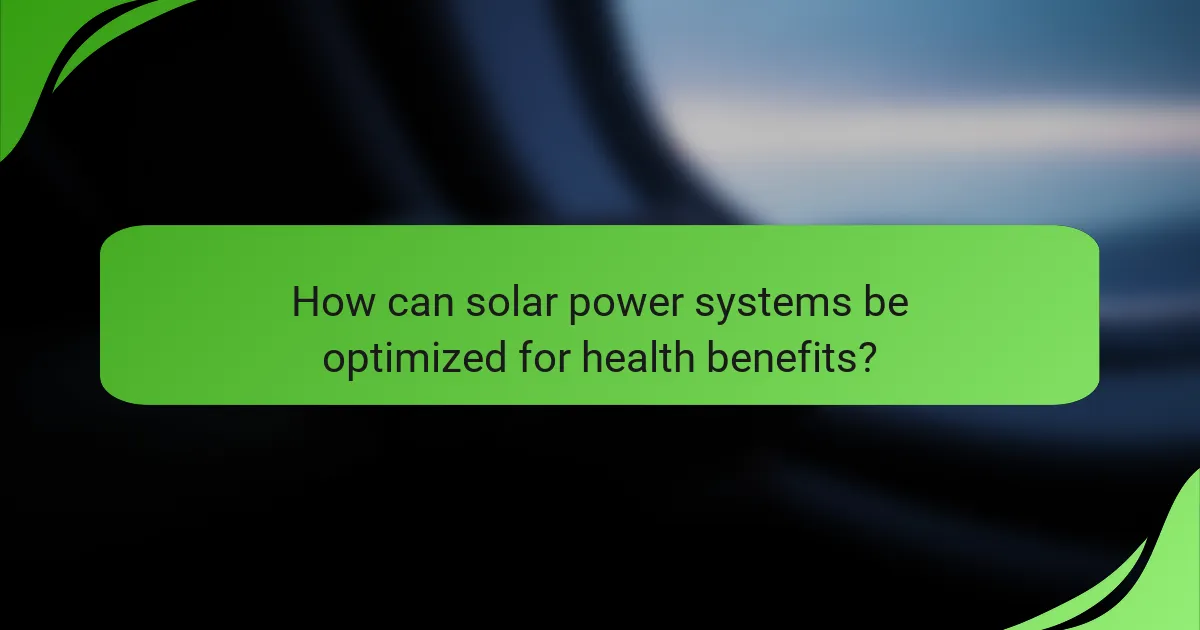
How can solar power systems be optimized for health benefits?
Solar power systems can be optimized for health benefits by ensuring they are properly installed, regularly maintained, and integrated with energy-efficient appliances. This not only maximizes energy output but also minimizes potential hazards associated with malfunctioning systems.
Regular maintenance practices
Regular maintenance of solar power systems is essential for ensuring their efficiency and safety. This includes routine inspections to check for dirt accumulation on panels, which can reduce energy production, as well as ensuring that all electrical components are functioning correctly.
Cleaning solar panels should be done at least twice a year, or more frequently in dusty environments. Additionally, checking for shading from nearby trees or buildings can help maintain optimal performance and prevent overheating, which can lead to health risks from electrical failures.
Homeowners should also keep an eye on inverter performance, as this device converts solar energy into usable electricity. If the inverter shows warning lights or fails to operate, it may indicate a need for professional servicing to prevent potential hazards.
